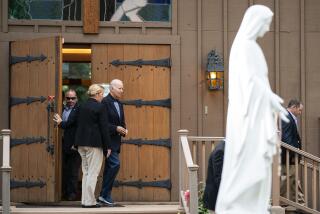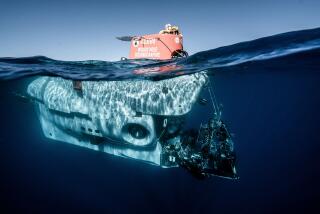Submarine exploring Lake Tahoe earthquake fault has motor problems
An unmanned submarine set to dive more than 1,000 feet to scour the bottom of Lake Tahoe didn’t quite make it all the way.
During shallower test dives earlier this month, the submarine encountered complications with a few of its motors, said Gordon Seitz with the California Geological Survey. The engineers who created the vessel considered the problems serious enough that they didn’t want to risk diving it all the way to the bottom of the lake, he said.
The 28-foot-long, 2,200-pound submarine, designed to explore beneath the ice shelves of Antarctica, was diving Lake Tahoe in its first test run. Seitz and his team hoped to capture valuable data and high-definition images of an earthquake fault along the lake’s bottom that scientists have wondered about for years.
Since 1998, when the West Tahoe fault was first put on the map, engineers have tried various ways to decipher the underwater fault, which they estimate — based on shore studies — is capable of producing a magnitude 7.1 to 7.4 earthquake and tsunamis up to 30 feet high every 2,500 to 4,000 years.
The last massive temblor was about 4,000 years ago, and scientists say now is the time to get better data.
“I wouldn’t say the earthquake’s overdue. But if it happened tomorrow, I wouldn’t be surprised,” said Seitz, who is leading the Lake Tahoe study. “It’s urgent enough that we want to look at it and figure it out.”
The fault, located along the floor of the lake’s western shore, is the most active of three major faults in the lake.
Overall, the test run this month went well, Seitz said. Engineers were able to test the remote controls and the submarine’s equipment, which included three video cameras, a laser for measuring objects, an acoustic sounder for profiling layers of the lake floor and other high-tech devices to map and produce X-ray-like images.
With enough funding going into next year, the team plans to try another test run in Lake Tahoe sometime in the spring -- this time, with a few more sensors and possibly a mechanical arm that can grab samples when it’s at the bottom exploring the fault.
“We were ready to do tests on the fault, but the submarine wasn’t quite ready,” Seitz said.
Seitz’s target is a six-mile section that he identified as the most active portion of the fault and one that has never been examined.
The team is excited to see for the first time, with clarity and control, what’s at the bottom of the lake, Seitz said. Any evidence they find of the last big earthquake would help them better assess future dangers.
All the results from the submarine dive, combined with recent on-shore studies, will help state officials begin drafting zoning regulations around faults in the Lake Tahoe region.
Reports from the dive will also give state conservation officials and engineers a better sense of earthquake-induced tsunamis, a hazard that experts say would threaten the many homes along the lakeshore. Unlike ocean tsunamis, whose massive waves break and then disappear, a tsunami in Lake Tahoe would go back and forth for hours, hitting one side of the lake and then the other, repeatedly, Seitz said.
The submarine was developed for a large research expedition in Antarctica by Northern Illinois University and built by DOER Marine, an Alameda-based robotics firm. The submarine, rated for a depth of 5,000 feet and capable of collapsing to 22 inches wide, was designed to go under an ice shelf the size of France, according to the university.
“They need to test it at a depth below 1,000 feet before they try for anything deeper and below ice. And Lake Tahoe’s the closest and most accessible for that,” Seitz said. “And we’re committed to reaching our scientific targets.”
ALSO:
Anaheim voting rights case ordered to go to trial
College student held by DEA without food, water gets $4.1 million
Man killed ex-boyfriend to collect insurance money, prosecutors say
Twitter: @RosannaXia
rosanna.xia@latimes.com
More to Read
Sign up for Essential California
The most important California stories and recommendations in your inbox every morning.
You may occasionally receive promotional content from the Los Angeles Times.











